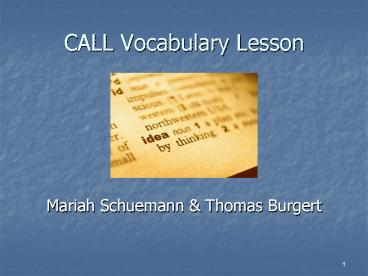CALL Vocabulary Lesson - PowerPoint PPT Presentation
1 / 13
Title:
CALL Vocabulary Lesson
Description:
Linked-course with lower-division Sociology- 'Communication & Mass Media' ... Dysphemism: exaggerating the bad qualities of one's opponents ... – PowerPoint PPT presentation
Number of Views:31
Avg rating:3.0/5.0
Title: CALL Vocabulary Lesson
1
CALL Vocabulary Lesson
- Mariah Schuemann Thomas Burgert
2
The Setting
- American university undergraduates
- English for Academic Purposes (EAP)
3
The Course
- Linked-course with lower-division Sociology-
Communication Mass Media - Pilot course integrates advanced ESL in CALL
environment with an examination into the
political aspects of news content and how news
coverage tends to favour the most powerful class
or groups in society.
4
The Course
- EAP students attend Sociology lectures with
native-speaker students twice a week - Twice a week students attend EAP/CALL course for
integrated language lesson and sociology
discussion from lecture syllabus - Students use in-class computers to locate
internet media samples related to the discussion
topic compose sentences on word processor
5
Lesson Background
- What is current topic in sociology lecture? How
the media softens or sensationalizes news events
how politicians frame issues (Lakoff, 2004) - What language feature is discussed in this
lesson? Vocabulary Euphemisms - What computer skills/software will learners use?
Internet search engine, Web news sources, Web
dictionary, Word
6
Lesson Background
- What informs our lesson? i.e, what theories of
vocabulary learning strategies guide our lesson? - Discover meaning teacher prompts word/phrase
orally accompanied with visual or contextual
support - Learners must have adequate background knowledge
- Context must be rich with utilizable clues
7
Lesson Background
- Consolidate meaning after initial discovery of a
word, group work promotes active processing of
information - Social context enhances motivation of
participants - Schmitt McCarthy (1997)
8
Lesson BackgroundEuphemisms
- English fluency cannot be achieved without a
basic command of euphemisms - Many euphemisms are semantically opaque
- Listeners and readers must decode euphemisms in
daily discourse, e.g., workplace, buisiness,
media - Alkire (2002)
9
Lesson BackgroundThe Semantics of Power
- Types of metaphors
- Euphemism downplaying ones own aggression
- Dysphemism exaggerating the bad qualities of
ones opponents - Mystification the use of jargon to conceal
certain activities - Bolinger (1980)
10
How is CALL used?
- Internet (context) learners locate target
words/phrases through Google news search - On-line dictionary/thesaurus to supplement
discovery process - Word processing learners create sentences using
target word/phrase (consolidation)
11
Large group (teacher models)
- Open internet look up target word(s)/phrases in
Merriam-Webster http//www.m-w.com/ - Compare your knowledge of the target words to the
dictionary definitions (each word of the
compound) - Search term in Google News how many hits?
- Open an article highlight term
- Open Word doc save as
12
Large Group
- Record article info in Word doc (source,
headline, URL) - Read term in context
- Discuss meaning in group how does euphemistic
meaning differ from literal meaning? How does
literal meaning affect our understanding of the
issue(s) euphemism refers to. - Collectively create new sentences with target
word/phrase in Word
13
References
- Alkire, S. (2002). Introducing euphemisms to
language learners. The Internet TESL Journal,
Vol. VIII, No. 5, May 2002 http//iteslj.org/Lesso
ns/Alkire-euphemisms.html Retrieved on 10/02/05. - Bolinger, D. (1980). Language The loaded weapon.
London Longman. - Lakoff, George. (2004). Dont think like an
elephant Know your values and frame the debate.
White River Junction, VT Chelsea Green. - Schmitt, N. McCarthy, M. (1997). Vocabulary
Description, acquisition and pedagogy. Cambridge,
UK Cambridge University Press.































